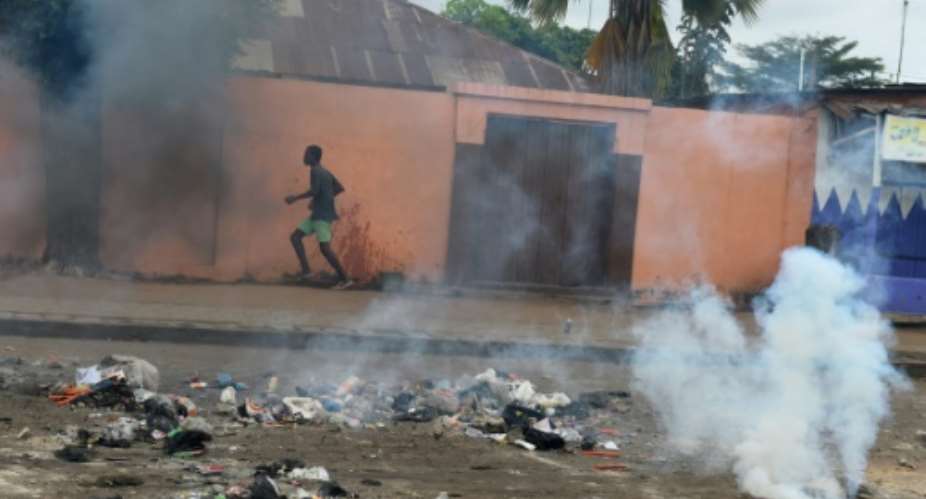Lome (AFP) - Several areas of Togo's capital, Lome, remained blocked off on Friday after security forces fired tear gas against anti-government protesters.
Shops were shut on main roads and in working-class districts of the coastal city, while there was a heavy police presence at main intersections, AFP journalists on the scene said.
In the Be area, where there were clashes with police throughout the night according to local residents, youths built barricades with rocks and burning tyres to block traffic.
"We want him to leave. We'll stay here until he goes. We're tired," said one of them, referring to President Faure Gnassingbe.
Residents in some parts of Lome said they were afraid to leave their homes. One man in his 40s refused to be filmed or give his name, fearing reprisals from the authorities.
Columns of smoke from tear gas fired by the security forces could be seen in the sky in several areas of the capital.
Telephone networks remained sporadic on Friday, with the internet still cut off in some parts of the country.
On Wednesday and Thursday, opposition supporters took to the streets in huge numbers to call for political reform, including a limit on the number of terms the president can serve.
Reform agenda
Protests were also held in several cities in the north -- which traditionally supports the regime -- such as Sokode, Bassar, Dapaong and Bafilo.
In Bafilo, protesters blocked traffic on the main road to Lome some 400 kilometres (250 miles) to the south, which also travels north to neighbouring Burkina Faso.
They were dispersed with tear gas on Thursday evening and calm was restored on Friday morning, said Amnesty International's Togo director, Aime Adi.
The protests were the biggest Faure Gnassingbe has faced since he became president in 2005 after the death of his father, Gnassingbe Eyadema, who ruled Togo for nearly 40 years.
During Eyadema's reign, hundreds were killed in violent clashes with government forces.
Togo's government made an apparent concession to the opposition on Tuesday evening, agreeing to put forward a bill to parliament on constitutional reform.
Lawmakers, who were due to return from their summer break only in October, have been recalled for an extraordinary session on September 12 to examine the proposals.
The bill includes a two-term limit for president, as well as a two-round voting system, but civil service minister Gilbert Bawara indicated the mandate provision would not be applied retroactively -- suggesting Gnassingbe could stay in power until elections in 2020.
Mohamed Ibn Chambas, the UN's special representative in West Africa and the Sahel, met Gnassingbe and opposition leader Jean-Pierre Fabre in Lome on Thursday.
Chambas told state television he had congratulated Gnassingbe for his offer and encouraged Fabre to join talks with the government "to definitively advance the reform agenda".
For the last two days, opposition leaders and protesters have been calling for Gnassingbe to step down, ending 50 years of rule by his family in the West African nation.
"It is too late," Fabre told his thousands of followers on the streets of Lome Thursday night.





 Meta releases new version of conversational AI across its platforms
Meta releases new version of conversational AI across its platforms
 Cape Town named Africa’s Best Airport 2024 by Skytrax
Cape Town named Africa’s Best Airport 2024 by Skytrax
 Bono East: Four injured after hearse transporting corpse crashes into a truck
Bono East: Four injured after hearse transporting corpse crashes into a truck
 ‘Be courageous, find your voice to defend our democracy’ — Sam Jonah urges journ...
‘Be courageous, find your voice to defend our democracy’ — Sam Jonah urges journ...
 Exodus of doctors, nurses and teachers have worsened because of unserious Akufo-...
Exodus of doctors, nurses and teachers have worsened because of unserious Akufo-...
 2024 election: Avoid insults, cutting down people in search of power – National ...
2024 election: Avoid insults, cutting down people in search of power – National ...
 ‘You passed through the back door but congratulations’ — Atubiga on Prof Jane Na...
‘You passed through the back door but congratulations’ — Atubiga on Prof Jane Na...
 Government’s $21.1 billion added to the stock of public debt has been spent judi...
Government’s $21.1 billion added to the stock of public debt has been spent judi...
 Akufo-Addo will soon relocate Mahama’s Ridge Hospital to Kumasi for recommission...
Akufo-Addo will soon relocate Mahama’s Ridge Hospital to Kumasi for recommission...
 We must not compromise on our defence of national interest; this is the time to ...
We must not compromise on our defence of national interest; this is the time to ...
